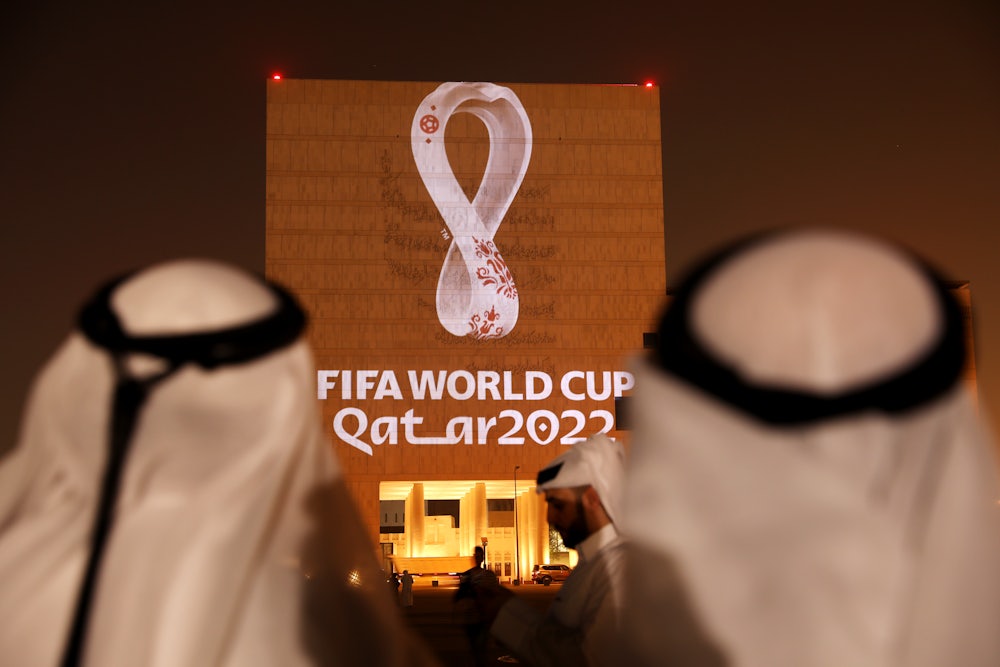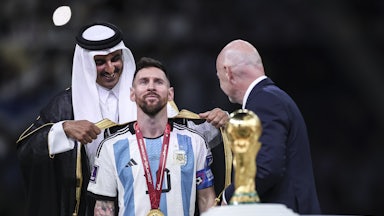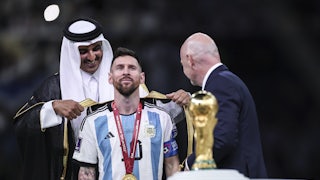If you’re visiting Washington, D.C., here’s a walking tour to try out. Buy a ticket to a show or sporting event at Capitol One arena, then head inside, snaking your way to section 113/114. Stop: You’ll see an exhibit bearing the State of Qatar’s coat of arms. After the event ends, take a short stroll northwest to CityCenter, settling into the plaza where pedestrian meets pricey. Stop: You’ll spot an Hermès, a Louis Vuitton, a Bulgari, and more, all built by real estate developer Qatari Diar. After a little shopping, hike uptown, traversing the blocks of nondescript buildings stacked between H and L Streets. Again, stop: You’ll have walked by the offices of Portland PR, Blueprint Advisors, and Mercury Public Affairs—three of Qatar’s top paid lobbyists. If, at this point, you’ve soured on the tour, then I’m sorry to say that D.C. may not be for you.
The nation’s capital is awash in foreign money meant to influence U.S. politics—that much has been true for years. But the recent news that the Qatar Investment Authority, or QIA, had bought a $200 million stake in the parent company of D.C.’s pro basketball and hockey teams takes the foreign influence game to another level. This is the first time a sovereign wealth fund, or SWF, has acquired a financial foothold in American sports. Up until now, Qatari dollars infiltrated the sector in other ways. And while QIA’s stake in Washington’s sports franchises stands at a mere 5 percent, if this move is anything like the ones the Gulf government has made in sports franchises the world over, then our walking tour will soon have to add more stops.
Qatari capital is among the country’s most formidable tools for manipulating the West.
This small Gulf monarchy’s role in the global sports sector is hardly a secret. I spent months mapping the reach of Qatar’s sports empire, particularly its investments in soccer. The most visible of these was last winter’s men’s World Cup, which showcased one of the competition’s most memorable finals ever before an audience of 1.5 billion viewers (and one Salt Bae). Soccer’s premiere tournament was just one of nearly 400 international sporting events the Qatari peninsula has hosted since the 1970s.
And its financial feats don’t end there. Global sports afford ambitious governments the opportunity to invest in myriad ways, from broadcasting events to sponsoring and owning properties. Accordingly, the Qatari state—through an armada of intermediaries—has conquered the sector’s value chain. Media giant beIN, an Al Jazeera spin-off, beams premium content like the UEFA Champion’s League to dozens of markets across Europe, North Africa, the Middle East, and Southeast Asia. Qatar Airways, the country’s flag carrier, is one of several state-owned enterprises to have sponsored high-profile clubs, its logos affixed on the jerseys of Germany’s Bayern Munich and Spain’s FC Barcelona. And Qatar Sports Investments, a sovereign wealth subsidiary, owns France’s Paris Saint-Germain and recently acquired a stake in Portugal’s SC Braga.
Some of these Qatari brands will be familiar to American eyes and ears. Supporters of North American soccer may have noticed e-billboards radiating the maroon and white of Qatar Airways at the recent USA-Mexico tie-up. The hoity-toitier among us have perhaps patronized the Qatar Airways Club while attending a Brooklyn Nets game. And bare-knuckle fighting fans have likely tuned in to beIN to catch a broadcast of the sport’s bloody bouts. State-linked Qatari companies, in other words, are no stranger to U.S. sports. But until recently, QIA was. And that should give Americans pause.
Of the many ways Gulf governments can direct capital overseas, SWFs are among the least accountable. These vehicles hold hundreds of billions of dollars’ worth of assets, yet as governmental actors, they operate along the murky margins of U.S. investment law. Financially, QIA doesn’t have to publicize its investment procedures, activities, or performance in annual reports. Absent such information, U.S. stakeholders have little to go on when vetting QIA’s acquisition decisions for noneconomic motives. And legally, QIA officials may be beyond the reach of U.S. courts. Just last year, Saudi Arabia’s SWF invoked sovereign immunity to shield LIV Golf, its upstart property, from relinquishing documents to, or having its officers deposed by, the PGA Tour.
Imagine if Dan Snyder, the outgoing owner of the NFL’s Washington Commanders, was able to keep his franchise’s financial misdeeds hidden from public view. Or, once in the crosshairs of regulators and legislators, to claim immunity from governmental scrutiny. Where would D.C.’s beleaguered fan base be today?
Unlike Snyder’s ill-advised moves, though, Qatar’s have more to do with geopolitics than bottom lines. Its investment vehicles, after all, are an outgrowth of the Qatari state, and the greater its leverage in a nation’s critical industries, the greater its influence over that nation’s foreign policies. Just ask the English. Beginning in 2017, Saudi Arabia and Qatar squared off in a thorny intellectual property dispute rippling from the kingdom’s sudden blockade of its easterly neighbor. The standoff, pitting Qatar’s beIN against a Saudi outfit pirating the broadcaster’s content, cost beIn millions. By 2020, direct appeals to the Saudi government and a legal challenge before the World Trade Organization had changed nothing.
So, beIN took a different tack. Leveraging its mammoth broadcasting deals with Europe’s top soccer leagues, the company threatened to end them unless the leagues helped crack down on Saudi piracy. Italy’s Serie A and Germany’s Bundesliga fell short of beIN’s expectations; both subsequently lost out on hundreds of millions in broadcasting revenue. England’s Premier League, however, gave in. It penned a letter to the Office of the U.S. Trade Representative asking it to keep Saudi Arabia on its priority watch list. Two months later, the agency released a report doing just that.
BeIN, to be sure, is not the same as QIA. Nor was the U.S. agency wrong to scribble the kingdom’s name onto its watch list. But it’s telling that Qatar’s investment armada could encircle English soccer enough to pressure a private institution in one country to lobby a public agency in another—all to counter an adversarial regime in a third.
That’s why QIA’s stake in D.C. sports is so troubling: It’s one more vehicle in Qatar’s arsenal of influence across the nation’s capital. And left unchecked, it’ll become just another overlooked part of the city’s political landscape.










